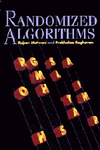Randomized Algorithms (Spring 2010)
This is the page for the class Randomized Algorithms for the Spring 2010 semester. Students who take this class should check this page periodically for content updates and new announcements.
There is also a backup page for off-campus users. The URL is http://lamda.nju.edu.cn/yinyt/random2010wiki/
Announcement
- (07/01/2010) 期末考试:时间7月6日,上午9点至11点;地点:教202。可携带一页A4打印纸(可双面)的笔记。
- (06/26/2010) 由于要统计考试人数,请参加期末考试的同学给我发email,把名字和学号告诉我。请看到通知的同学互相告知一下。
- (06/24/2010) 第四次作业答案公布。第三次作业答案已经补完。Sorry for the delay!
- (06/11/2010) 由于端午节轮休,6月15日的课改在13日星期日。
- (06/01/2010) The fifth homework is out. Due on Tuesday June 15, in class.
- (05/26/2010) 第十三课中的Estimator Theorem中有一处笔误,[math]\displaystyle{ \epsilon }[/math]应为[math]\displaystyle{ \epsilon^2 }[/math]。感谢钱超同学发现这个问题。
Course info
- Instructor : 尹一通,
- email: yitong.yin@gmail.com, yinyt@nju.edu.cn, yinyt@lamda.nju.edu.cn
- office: MMW 406.
- Class meeting: 10am-12 am, Tue; 馆III-101.
- Office hour: 2-5pm, Sat; MMW 406.
Syllabus
随机化(randomization)是现代计算机科学最重要的方法之一,近二十年来被广泛的应用于计算机科学的各个领域。在这些应用的背后,是一些共通的随机化原理。在随机算法这门课程中,我们将用数学的语言描述这些原理,将会介绍以下内容:
- 一些重要的随机算法的设计思想和理论分析;
- 概率论工具及其在算法分析中的应用,包括常用的概率不等式,以及数学证明的概率方法 (the probabilistic method);
- 随机算法的概率模型,包括典型的随机算法模型,以及概率复杂度模型。
作为一门理论课程,这门课的内容偏重数学上的分析和证明。这么做的目的不单纯是为了追求严格性,而是因为用更聪明的方法去解决问题往往需要具备有一定深度的数学思维和数学洞察力。
先修课程 Prerequisites
- 必须:离散数学,概率论。
- 推荐:算法设计与分析。
Course materials
Policies
Assignments
- (06/29/2010) Problem Set 6 makeup assignment, hand in before the final exam.
- (06/01/2010) Problem Set 5 due on June 15 , Tuesday, in class. 中英文不限。
- (05/18/2010) Problem Set 4 due on June 1 , Tuesday, in class. 中英文不限。
- (04/20/2010) Problem Set 3 due on May 4, Tuesday, in class. 中英文不限。
- (03/30/2010) Problem Set 2 due on April 13, Tuesday, in class. 中英文不限。
- (03/16/2010) Problem Set 1 due on March 30, Tuesday, in class. 中英文不限。
Lecture Notes
- Introduction | slides | print version
- Complexity classes, lower bounds | slides | print version
- Balls and bins | slides | print version
- Tail inequalities | slides | print version
- Set balancing, packet routing, and metric embedding | slides | print version
- Hashing, limited independence | slides | print version
- Martingales | slides | print version
- The probabilistic method | slides | print version
- [Midterm review, and screening of a documentary film about Paul Erdős]
- Markov chains and random walks | slides | print version
- Expander graphs, rapid mixing random walks | slides | print version
- Random sampling, MCMC | slides | print version
- Approximate counting, linear programming | slides | print version
- Randomized approximation algorithms | slides | print version
- Fingerprinting | slides | print version
- Guest lecture by Yang Yu on metaheuristics. | slides
- Distributed algorithms, data streams | slides | print version
- Review session.
Future plan
Topics that I'm considering to cover at next time when I teach this class (perhaps):
- Janson's inequality,
- Talagrand's inequality
- The Poisson Approximation
- Fourier analysis
- Random graphs
- Entropy and randomness
- Derandomization
- Color-coding
- On-line algorithms
- Property testing
- Learning and boosting
- Compressed sensing
Feel free to send me an email at any time to tell what topics you would like this class to cover in future.
The Probability Theory Toolkit
- Linearity of expectation (introduced in Lecture Notes 1, 3)
- Independent events and conditional independence (introduced in Lecture Notes 3)
- Conditional probability and conditional expectation (introduced in Lecture Notes 3)
- The law of total probability and the law of total expectation (introduced in Lecture Notes 2, 3)
- The union bound (introduced in Lecture Notes 3)
- Bernoulli trials (introduced in Lecture Notes 3)
- Geometric distribution (introduced in Lecture Notes 3)
- Binomial distribution (introduced in Lecture Notes 3, 4)
- Markov's inequality (introduced in Lecture Notes 4)
- Chebyshev's inequality (introduced in Lecture Notes 4)
- Chernoff bound (introduced in Lecture Notes 4)
- k-wise independence (introduced in Lecture Notes 6)
- Martingale (introduced in Lecture Notes 7)
- Azuma's inequality and Hoeffding's inequality (introduced in Lecture Notes 7)
- Doob martingale (introduced in Lecture Notes 7)
- The probabilistic method (introduced in Lecture Notes 8)
- The Lovász local lemma and the algorithmic Lovász local lemma (introduced in Lecture Notes 8)
- Markov chain:
- reducibility, Periodicity, stationary distribution, hitting time, cover time, (introduced in Lecture Notes 10);
- mixing time, conductance (introduced in Lecture Notes 11 and 12)
Acknowledgment
Thanks the LAMDA group for hosting the webpage for off-campus users. Special thanks to YU Yang for his time and technical supports.
